FBI Most Wanted Terrorists
The FBI Most Wanted Terrorists is a list created and first released on October 10, 2001, with the authority of United States President Bush, following the September 11 attacks on the United States. Initially, the list contained 22 of the top suspected terrorists chosen by the FBI, all of whom had earlier been indicted for acts of terrorism between 1985 and 1998. None of the 22 had been captured by US or other authorities by that date. Of the 22, only Osama Bin Laden was by then already listed on the FBI Ten Most Wanted Fugitives list.

No particular legal consequences flowed from the creation of and inclusion on the list. On January 17, 2002, the FBI released a third major FBI wanted list, which has now become known as the FBI Seeking Information – War on Terrorism list, to enlist the public's help in reporting information which may prevent future terrorist attacks. The information sought to be reported is not necessarily relating to any person on any of the FBI wanted lists.
Initial persons alleged to be terrorist fugitives
On the fugitive group wanted poster, the FBI did not list the persons in any particular stated order, except perhaps for the consistent placing of bin Laden in the number one position of the top row. However, the 22 can easily fit into distinct categories over the two decades, based on the terrorist attacks in which they were, according to US authorities, involved.
For organization and ease of reference here, the relevant major terrorist attacks are listed by date below, with a brief summary for each, identifying the terror cells most directly responsible for the attack. The 22 on the list are then grouped beneath the attack for which each person was first accused of involvement.[1]
| Photo | Name | Alleged terrorist activity | Date of activity | Status |
|---|---|---|---|---|
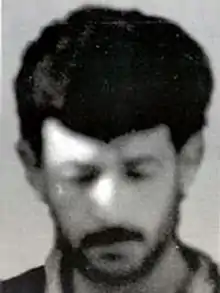 Hassan Izz-Al-Din |
Hassan Izz-Al-Din | TWA Flight 847 | June 14, 1985 | At large |
| Thought to be living in Lebanon.[2] | ||||
 Abdul Rahman Yasin in 2002 |
Abdul Rahman Yasin | 1993 World Trade Center bombing | November 17, 1996 | At large |
| Accused of constructing bombs in the 1993 World Trade Center bombing. Aliff was allegedly a prisoner of Saddam Hussein in 2003, but has since gone missing from Iraq. He was not located during the 2003 invasion of Iraq. | ||||
Khalid Shaikh Mohammed |
Khalid Sheikh Mohammed | Bojinka plot | 1994–1995 | Captured |
| Captured in Pakistan on March 1, 2003. | ||||
| Ahmed Ibrahim Al-Mughassil | Khobar Towers bombing | June 25, 1996 | At Large | |
| Al-Mughassil was captured in Lebanon on August 7, 2015, and extradited to Saudi Arabia.[3] However, he was not taken into US custody and is still listed as wanted. | ||||
| Ali Saed Bin Ali El-Hoorie | Khobar Towers bombing | June 25, 1996 | At large | |
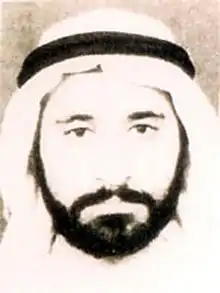 |
Ibrahim Salih Mohammed Al-Yacoub | Khobar Towers bombing | June 25, 1996 | At large |
| Wanted for Conspiracy to Kill U.S. Nationals; Conspiracy to Murder U.S. Employees; Conspiracy to Use Weapons of Mass Destruction Against U.S. Nationals; Conspiracy to Destroy Property of the U.S.; Conspiracy to Attack National Defense Utilities; Bombing Resulting in Death; Use of Weapons of Mass Destruction Against U.S. Nationals; Murder While Using Destructive Device During a Crime of Violence; Murder of Federal Employees; Attempted Murder of Federal Employees | ||||
| Abdelkarim Hussein Mohamed Al-Nasser | Khobar Towers bombing | June 25, 1996 | At large | |
 Mohammed Atef |
Mohammed Atef | 1998 United States embassy bombings | August 7, 1998 | Killed |
| Killed in Afghanistan on November 14, 2001, by a Predator missile attack on his home outside of Kabul. | ||||
 Osama bin Laden |
Osama bin Laden | 1998 United States embassy bombings | August 7, 1998 | Killed |
| Killed by U.S. Navy Seals in a compound in Abbottabad, Pakistan; announced dead May 2, 2011.[4][5] He was placed on the Most Wanted Terrorists list for his involvement in the bombings of the U.S. embassies in Nairobi, Kenya and Dar es Salaam, Tanzania.[1] | ||||
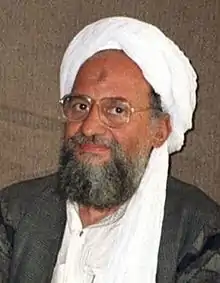 Ayman al-Zawahiri |
Ayman al-Zawahiri | 1998 United States embassy bombings | August 7, 1998 | At large |
| Osama bin-Laden's successor as Al-Qaeda's chieftain, Ayman al-Zawahiri is under indictment in the United States for his suspected role in the 1998 U.S. embassy bombings in Dar es Salaam, Tanzania, and Nairobi, Kenya. The Rewards for Justice Program of the U.S. Department of State is offering a reward of up to US$25 million for information about his location and capture.[6] | ||||
| Fazul Abdullah Mohammed | 1998 United States embassy bombings | August 7, 1998 | Killed | |
| Reports surfaced on June 11, 2011, that he was killed in Somalia.[7] Kenyan police stated, through DNA testing, that they were certain he was killed by Somalian forces on June 8.[7] Officially listed as deceased on the FBI website by June 12.[6] | ||||
 Mustafa Mohamed Fadhil |
Mustafa Mohamed Fadhil | 1998 United States embassy bombings | August 7, 1998 | Killed |
| Killed in Afghanistan.[8][9][10] He was removed from the list in May 2005. | ||||
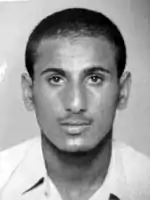 Fahid Mohammed Ally Msalam |
Fahid Mohammed Ally Msalam | 1998 United States embassy bombings | August 7, 1998 | Killed |
| Killed January 1, 2009, in an unmanned aerial strike in Pakistan along with Sheikh Ahmed Salim Swedan.[11] | ||||
 Ahmed Khalfan Ghailani |
Ahmed Ghailani | 1998 United States embassy bombings | August 7, 1998 | Captured |
| Captured in Pakistan on July 25, 2004, and later held in Guantanamo Bay, Cuba. Ghailani was tried by a civilian court in New York in 2010 and convicted of conspiring to bomb the American embassies in Tanzania and Kenya. The jury however acquitted him of all other 284 charges, including attempted murder.[12] | ||||
| Sheikh Ahmed Salim Swedan | 1998 United States embassy bombings | August 7, 1998 | Killed | |
| Killed January 1, 2009, in an unmanned aerial strike in Pakistan along with Fahid Mohammed Ali Msalam.[11] | ||||
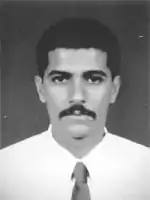 Abdullah Ahmed Abdullah |
Abdullah Ahmed Abdullah | 1998 United States embassy bombings | August 7, 1998 | Killed |
| Abdullah, also known as Abu Mohammed al-Masri, was reported to have been killed in Tehran, Iran on August 7, 2020, by Israeli operatives working on behalf of the United States government. His death was reported 3 months later.[13] His death was confirmed by the United States Secretary of State Mike Pompeo on January 12, 2021.[14][15] | ||||
| Anas al-Liby | 1998 United States embassy bombings | August 7, 1998 | Dead | |
| Al-Liby was captured in Tripoli, Libya on October 5, 2013, by Delta Force commandos.[16] Abu Anas al Liby died on January 2, 2015, at a hospital in New York, aged 50, while in United States custody. He had liver disease as a result of hepatitis C.[17] | ||||
| Saif al-Adel | 1998 United States embassy bombings | August 7, 1998 | At large | |
 Ahmed Mohammed Hamed Ali |
Ahmed Mohammed Hamed Ali | 1998 United States embassy bombings | August 7, 1998 | Killed |
| Reported as killed in a drone strike in 2010 in Pakistan by the National Counterterrorism Center.[18][19] He was removed from the list in 2012. | ||||
 Muhsin Musa Matwalli Atwah |
Muhsin Musa Matwalli Atwah | 1998 United States embassy bombings | August 7, 1998 | Killed |
| Killed April 12, 2006, along with 6 other alleged militants by Pakistani forces in a helicopter gunship raid on the village of Naghar Kalai near the Afghan border. Villagers reported that armed men removed the bodies.[20] Atwah's death was confirmed by US officials on October 24, 2006, following DNA testing, and he was removed from the list.[21] | ||||
FBI Seeking Information – War on Terrorism list
Whereas the Most Wanted Terrorists list is reserved for terrorist fugitives who have been indicted by federal grand juries, the FBI recognized a further need to achieve a much quicker response time in order to prevent any future attacks which may be in the current planning stages. To enlist the public's help in this effort, the FBI sought a way to deliver the early known suspected terror attack information, often very limited, out to the public as quickly as possible. So, on January 17, 2002, the third major FBI wanted list was first released, which has now become known as the FBI Seeking Information – Terrorism list.
As the name of this list implies, the FBI's intent is to acquire any critical information from the public, as soon as possible, about the suspected terrorists, who may be in the planning stages of terror attacks against United States nationals at home and abroad. The first such list profiled five persons about whom little was known, but who were suspected of plotting terrorist attacks in martyrdom operations. The main evidence against the five was five videos they had produced, found in the rubble of Mohammed Atef's destroyed home outside Kabul, Afghanistan.
Additions to the list
By 2006, more than four years had passed since the FBI had listed the original 22 alleged terrorists on the Most Wanted Terrorist list. Of those 22, by then four had been qualified for removal from the list, due to death or capture. Also by then, the FBI determined that new persons qualified to be listed as Most Wanted Terrorists. Some of these persons were indicted for attacks and plots that had taken place since the original list had been compiled. The original indictments had been for incidents only through 1998. Since then, the U.S. had become victim to at least two major terror attacks, which would generate some of the new indictments for the Most Wanted Terrorists, notably:
- USS Cole bombing in 2000, which killed 17 American sailors and wounded 40 on October 12, 2000, off the port coast of Aden, Yemen
- September 11, 2001 attacks in Manhattan, Washington D.C., and Pennsylvania
In addition, after the original 2001 list had been compiled and released to the public, the U.S. had foiled and issued indictments for numerous other plots, involving some new listed Most Wanted Terrorists. Those notable other plots involved:[22]
- The Buffalo Six, a Buffalo, New York cell, or Lackawanna Cell, exposed September 2002
- Palestinian Islamic Jihad, on Racketeer Influenced and Corrupt Organizations Act (RICO) charges for plots based from Syria since 1995
- Abu Sayyaf kidnappings and murders of foreign nationals in the Philippines
In February 2006, the FBI completed two groups of additions to the Most Wanted Terrorists list, the first such additions in over four years. On February 24, 2006, the day after adding two name to the list, the FBI added an additional six fugitive terrorists, for various plots and attacks. One of the entries was for an indictment dating back to the June 14, 1985, hijacking of TWA flight 847 by Hezbollah (see above).
Additionally, the FBI also added to the Seeking Information – War on Terrorism list an additional three persons, most notably, Abu Musab al-Zarqawi, the notorious leader of Al-Qaeda in Iraq.[23] This marked the first time that al-Zarqawi had appeared on any of the three major FBI wanted lists. On June 8, 2006, ABC News reported that Abu Musab al-Zarqawi was confirmed to have been killed in Baghdad in a bombing raid by a United States task force. His death was confirmed by multiple sources in Iraq, including the United States government.
| Photo | Name | Alleged terrorist activity | Date of Activity | Date Added to List | Status |
|---|---|---|---|---|---|
 Jamel Ahmed Mohammed Ali Al-Badawi |
Jamal Ahmad Mohammad Al Badawi | USS Cole bombing | October 12, 2000 | February 23, 2006 | Killed |
| Rewards for Justice offered $5 million for information leading to his capture or conviction.[6] He was killed in a drone strike on January 1, 2019 in Ma'rib Governorate, Yemen.[24][25] | |||||
 Jaber A. Elbaneh |
Jaber A. Elbaneh | Buffalo Six | Sometime in 2002 | February 23, 2006 | At large |
| Surrendered to Yemeni authorities on May 20, 2007.[26] However, he was not taken into US custody and is still listed as wanted. | |||||
 Mohammed Ali Hammadi |
Mohammed Ali Hamadei | TWA Flight 847 | June 14, 1985 | February 24, 2006 | At large |
| Rewards for Justice offering $5 million for information leading to his capture or conviction.[6] Thought to be in Lebanon.[27] | |||||
 |
Ramadan Abdullah Mohammad Shallah | Palestinian Islamic Jihad, on RICO | Since 1995 | February 24, 2006 | Deceased |
| Wanted for conspiracy to conduct the affairs of the designated international terrorist organization known as the "Palestinian Islamic Jihad". Shalah died on June 6, 2020, in Lebanon after a long illness.[28] | |||||
| Abd Al Aziz Awda | Palestinian Islamic Jihad, on RICO | Since 1995 | February 24, 2006 | At large | |
 Khadafi Abubakar Janjalani |
Khadafi Abubakar Janjalani | Abu Sayyaf kidnaps & murders in the Philippines | Early 1990s - 2000s (decade) | February 24, 2006 | Killed |
| Died of gunshot wounds on September 4, 2006. Philippine marines found the remains of his body on December 27, 2006. Death was confirmed by DNA testing on January 20, 2007.[29][30] Listed as deceased as of January 22, 2007. Removed from list as of February 21. | |||||
 Jainal Antel Sali |
Jainal Antel Sali | Abu Sayyaf kidnaps & murders in the Philippines | Early 1990s - 2000s (decade) | February 24, 2006 | Killed |
| Killed by Philippines special forces on January 16, 2007.[31] | |||||
 Isnilon Totoni Hapilon |
Isnilon Totoni Hapilon | Abu Sayyaf kidnaps & murders in the Philippines | Early 1990s - 2000s (decade) | February 24, 2006 | Killed |
| Killed by the Philippine Army on October 16, 2017.[32] | |||||
 Adam Yahiye Gadahn |
Adam Yahiye Gadahn | Treason | 2003–2015 | October 11, 2006 | Killed |
| Gadahn was removed by the FBI from the Seeking Information - War on Terrorism list on October 11, 2006, and placed instead on the FBI Most Wanted Terrorists list.[33] Also, on October 11, 2006, Gadahn was indicted on a treason charge by a federal grand jury in Santa Ana, California making him the first American charged with treason since 1952.[34] Rewards for Justice offered $1 million for information leading to his capture.[6] He was killed in a drone strike in Pakistan on January 19, 2015.[35] | |||||
.jpg.webp) Daniel Andreas San Diego |
Daniel Andreas San Diego | Chiron and Shaklee bombings | August 28, 2003 September 26, 2003 |
April 11, 2009 | At large |
| San Diego was added to the FBI Most Wanted Terrorists list in connection with two Animal Liberation Brigade bombings in Northern California in 2003. He is the second United States citizen, and the first domestic terrorist, to appear on the list.[36][37] The FBI is offering $250,000.00 for information leading to his arrest.[6] | |||||
| Fahd al-Quso | USS Cole bombing | October 12, 2000 | November 2, 2009 | Killed | |
| Sought for his role in the October 2000 bombing of the USS Cole in Yemen, in which 17 American sailors were killed.[38] Rewards for Justice offered $5 million for information leading to his capture or conviction [6] He was killed in a drone strike in Yemen on May 6, 2012. | |||||
| Husayn Muhammed al-Umari | Pan Am Flight 830 Bombing | August 11, 1982 | November 2, 2009 | At large | |
| Also known as Abu Ibrahim, is wanted in connection with the 1982 bombing of Pan Am Flight 830.[38][39] | |||||
| Wadoud Muhammad Hafiz Al-Turki | Pan Am Flight 73 | September 5, 1986 | December 3, 2009 | At large | |
| Wanted for his role in the hijacking of Pan American World Airways Flight 73.[40] | |||||
| Jamal Saeed Abdul Rahim | Pan Am Flight 73 | September 5, 1986 | December 3, 2009 | At large[41] | |
| Wanted for his role in the hijacking of Pan American World Airways Flight 73.[40] | |||||
| Muhammad Abdullah Khalil Hussain Ar-Rahayyal | Pan Am Flight 73 | September 5, 1986 | December 3, 2009 | At large | |
| Wanted for his role in the hijacking of Pan American World Airways Flight 73.[40] | |||||
| Muhammad Ahmed Al-Munawar | Pan Am Flight 73 | September 5, 1986 | December 3, 2009 | At large | |
| Wanted for his role in the hijacking of Pan American World Airways Flight 73.[40] | |||||
 Adnan G. El Shukrijumah |
Adnan Gulshair el Shukrijumah | New York City Subway suicide bomb planning | September 2009 | July 8, 2010 | Killed |
| Wanted for his alleged role in the plot against New York City's subway system, uncovered in September 2009.[42] He was killed in a manhunt operation by Pakistan in South Waziristan on 6 December 2014.[43] | |||||
 Assata Shakur |
Assata Shakur (née JoAnne Deborah Byron, married name Joanna Chesimard) | Murder of Trooper Werner Foerster on May 2, 1973 | May 2, 1973 | May 2, 2013 | At large |
| Former Black Liberation Army member openly living in Cuba after she escaped from a New Jersey prison in 1979. Two million dollar reward offered.[44] | |||||
Rewards
Since 1984, the United States government has also used the Rewards for Justice Program, which pays monetary rewards of up to $5 million, or now, in some cases more, upon special authorization by the United States Secretary of State, to individuals who provide information which substantially leads to countering of terrorist attacks against United States persons. More than $100 million had been paid to over 60 people through this program.[45]
The Rewards for Justice Program was established by the 1984 Act to Combat International Terrorism, Public Law 98-533, and is administered by the Bureau of Diplomatic Security, within the U.S. Department of State.[45]
See also
- Captured al-Qaeda members
References
- "Most wanted terrorists list released". CNN. October 1, 2001. Archived from the original on July 14, 2008. Retrieved July 18, 2008.
- "Fbi — Hasan Izz-Al-Din". Fbi.gov. Retrieved December 30, 2012.
- "With Khobar Bomber's Arrest, Saudi Arabia Deals Blow to Iran". U.S. News & World Report. September 1, 2015. Retrieved September 6, 2015.
- "Operation was designed to kill bin Laden, source says". CNN.com. May 2, 2011. Retrieved May 2, 2011.
- "Osama Bin Laden Killed By Navy SEALs in Firefight". ABC.com. May 2, 2011. Retrieved May 7, 2011.
- "Most Wanted Terrorists". FBI.gov. Retrieved May 25, 2011.
- "AFP: Al-Qaeda's E. Africa chief believed dead: US official". June 11, 2011. Retrieved December 30, 2012.
- "Archived copy". Archived from the original on March 12, 2014. Retrieved April 24, 2013.CS1 maint: archived copy as title (link)
- "Intelwire: Open-source intelligence, primary source documents, analysis by J.M. Berger, co-author of ISIS: The State of Terror, author of Jihad Joe: Americans Who Got to War in the Name of Islam" (PDF). americanjihadists.com. Archived from the original (PDF) on July 16, 2014. Retrieved March 27, 2014.
- "Recommendation for Continued Detention Under DoD Control" (PDF). Department of Defense. Retrieved January 25, 2013.
- "Two Top Al Qaeda Terrorists Killed in Missile Attack". FOX News. January 8, 2009. Archived from the original on January 11, 2009. Retrieved January 9, 2009.
- Charlie Savage (November 18, 2010). "Terror Verdict Tests Obama's Strategy on Civilian Trials". The New York Times. Retrieved May 14, 2013.
- https://www.nytimes.com/2020/11/13/world/middleeast/al-masri-abdullah-qaeda-dead.html?campaign_id=60&emc=edit_na_20201113&instance_id=0&nl=breaking-news&ref=headline®i_id=71380797&segment_id=44501&user_id=a59c2f17ea4c3566169775b1df16ab93
- Jakes, Lara; Schmitt, Eric; Barnes, Julian E. (January 12, 2021). "Pompeo Says Iran Is New Base for Al Qaeda, but Offers Little Proof". The New York Times. ISSN 0362-4331. Retrieved January 12, 2021.
- "Pompeo Confirms Death of Al-Qaeda's No. 2 in Tehran Last August". Bloomberg.com. January 12, 2021. Retrieved January 12, 2021.
- "Man Sought In '98 Attacks On Embassies Is Seized". NY Times. Retrieved October 5, 2013.
- "Suspected Plotter of U.S. Embassy Attacks Abu Anas Al-Libi Dies in New York - NBC News". Retrieved July 24, 2016.
- "Report: Drone strikes killing few leaders". United Press International, Inc. February 21, 2011. Retrieved February 28, 2011.
- "Increased U.S. drone strikes in Pakistan killing few high-value militants". The Washington Post. February 20, 2011. Retrieved December 30, 2012.
- Pakistan: Al-Qaeda militant killed near border, Associated Press, USA April 13, 2006
- One of FBI's 'Most Wanted Terrorists' confirmed dead, CNN, October 24, 2006
- "Recent Escapees From Yemen Prison Added to Most Wanted Terrorists and Seeking Information - War on Terrorism Lists". Federal Bureau of Investigation. February 23, 2006. Archived from the original on April 11, 2010. Retrieved August 14, 2012.
- "FBI Updates Most Wanted Terrorists and Seeking Information – War on Terrorism Lists". FBI.gov. February 24, 2010. Archived from the original on August 30, 2010. Retrieved January 3, 2012.
- Browne, Ryan; Starr, Barbara. "Trump: US military killed terrorist behind USS Cole bombing". CNN.
- "USCENTCOM confirms the death of Jamal al-Badawi". U.S. Central Command.
- "U.S. Fugitive Born in Yemen Surrenders in Terror Case". The New York Times. May 25, 2007. Retrieved January 9, 2009.
- "FBI — MOHAMMED ALI HAMADEI". FBI.
- "Former chief of Palestinian Islamic Jihad dies". The Times of Israel.
- "U.S. Confirm Abu Sayyaf Leader's Death". ABC News. Manila, Philippines. Associated Press. January 20, 2007. Archived from the original on January 21, 2007.
- "U.S. Confirm Abu Sayyaf Leader's Death". The Washington Post. January 20, 2007. Retrieved September 6, 2015.
- Jim Gomez (January 17, 2007). "Philippines says militant's death a blow". Yahoo! News. Associated Press. Archived from the original on January 18, 2007. Retrieved October 17, 2017.
- "Philippines military 'kills Islamist Isnilon Hapilon'". BBC News. October 16, 2017. Retrieved October 17, 2017.
- American Al-Qaeda Member Gadahn Charged With Treason by U.S., Bloomberg, By Robert Schmidt, October 11, 2006
- American Al Qaeda Member to Be Indicted for Treason Archived February 2, 2011, at the Wayback Machine, Fox News, October 12, 2006
- Greg Botelho and Ralph Ellis. "American mouthpiece for al Qaeda killed". CNN. Retrieved July 24, 2016.
- "Daniel Andreas San Diego Added to FBI's 'Most Wanted Terrorists' List". BackgroundNow.com. April 21, 2009. Retrieved April 28, 2009.
- "Animal rights activist on FBI's 'Most Wanted Terrorists' list". CNN. April 21, 2009. Retrieved September 6, 2015.
- Two Names Added to List, FBI.gov, November 24, 2009, retrieved May 20, 2010
- Rewards for Justice - Husayn Muhammed al-Umari Reward Offer, U.S. State Department, November 24, 2009, retrieved May 20, 2010
- Rewards for Justice - Reward Offer for Pan Am Flight 73 Hijackers, U.S. State Department, December 3, 2009, retrieved May 20, 2010
- "FBI — JAMAL SAEED ABDUL RAHIM". FBI.
- "Adnan G. el Shukrijumah". FBI.gov. Retrieved February 28, 2011.
- "Top Al Qaeda Commander Adnan el Shukrijumah Killed: Pakistan Army". NBC News.
- Jones, David (May 2, 2013). "New Jersey trooper's killer is first woman on FBI most wanted terror list". Reuters. Retrieved May 29, 2020.
- "Rewards for Justice: Program Overview". Rewards for Justice. Archived from the original on May 16, 2011. Retrieved May 25, 2011.
External links
| Wikimedia Commons has media related to FBI Most Wanted Terrorists. |